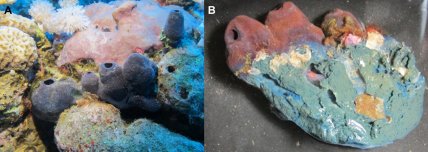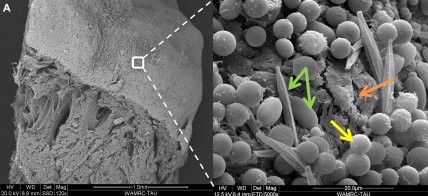True metalheads dwell at the ocean's depths: a new species of sponge has astonished scientists.
The animal kingdom will never cease to amaze humanity, as for every unusual creature, there is always something even stranger. This time, scientists have focused on the marine sponge Theonella conica, which turns out to have a penchant for heavy metals.
However, this is not about extreme music, but rather about molybdenum, which the sponge accumulates within itself. A new study has been published in the journal Science Advances.
Molybdenum is a heavy metal that, nonetheless, is found in some essential compounds involved in biochemical processes such as nitrogen fixation and nitrate reduction. However, in the sponges T. conica, its concentration was found to be significantly higher than what is necessary for the aforementioned processes.
Since molybdenum, like other heavy metals, is toxic in large concentrations, a "overdose" could be fatal for any other organism. But the sponges Theonella conica have found an unexpected advantage in this trait — a toxic organism cannot be consumed without consequences.
This species of sponge lives in the Red Sea and the Indian Ocean (at least they have been spotted off the coast of Zanzibar). Samples taken from the Red Sea showed that the molybdenum concentration reached 46,793 micrograms per gram of dry sponge weight, while the Zanzibar samples were slightly less toxic at 28,423 micrograms per gram of body weight. For comparison, consuming doses above 10,000 micrograms per kilogram of body weight could already lead to serious consequences for humans, including liver or kidney damage.

Scientists note that symbiotic bacteria of the genus Entotheonella, which primarily reside in the outer layers of these animals, play a key role in the accumulation process by binding molybdenum with calcium and fixing it in spherical granules.

It is quite likely that this holds the secret of how the sponges do not poison themselves with heavy metals, as calcium molybdate is quite stable in marine conditions and does not harm the sponge, although it can be deadly for those who dare to feast on it.
Studying the mechanisms of metal accumulation in living organisms could also benefit humans. For example, sponges Theonella swinhoei from the same family use their symbiotic bacteria to absorb arsenic, and scientists are already looking for ways to utilize them for water purification.
As previously reported, researchers discovered that comb jellies can fuse with other members of their species when damaged. In this way, two animals literally become one.